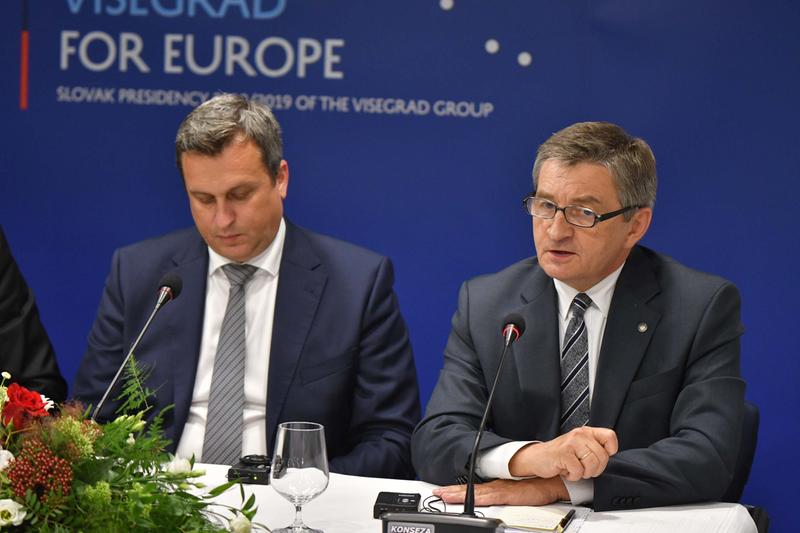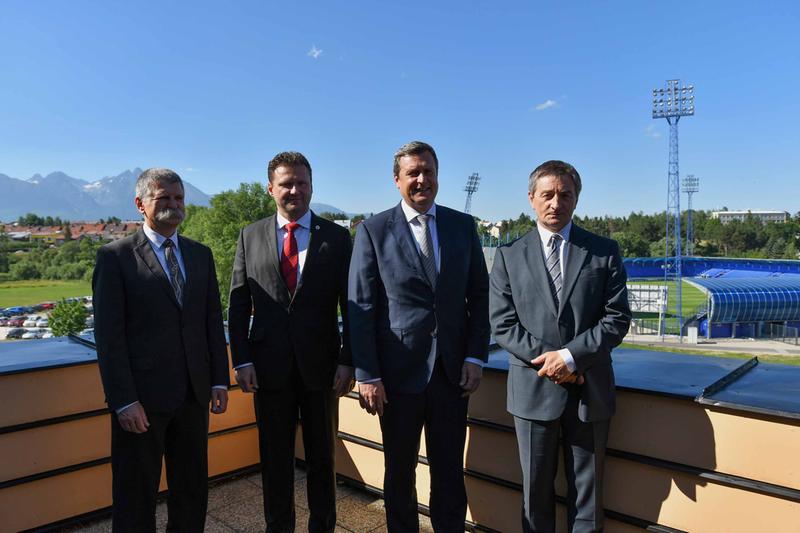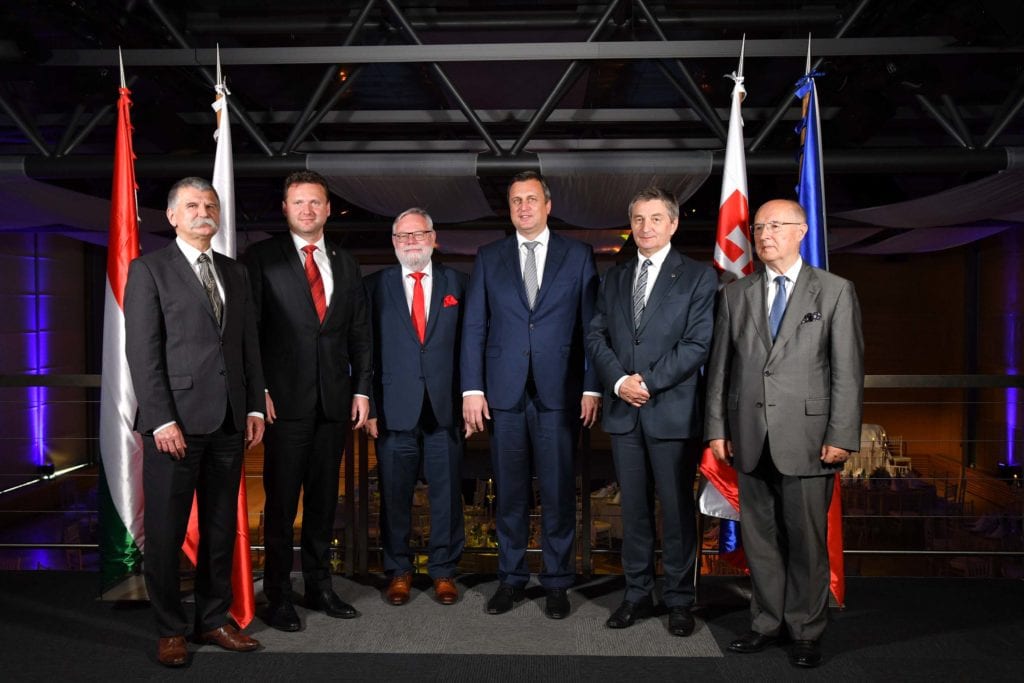I am in favour of looking for the future and building the future of the EU on the basis of a Europe of homelands, solidarity and sovereign states. For us, the countries that have only been rebuilding their patriotic awareness for the last 30 years, this is of great importance', said Speaker of the Sejm Marek Kuchciński during the meeting (27 June) of the heads of parliament of the Visegrad Group countries in Poprad, Slovakia. Politicians from Poland, the Czech Republic, Slovakia and Hungary discussed the future of the EU in the context of the recent elections to the European Parliament and summarized Slovakia's presidency of the Visegrad Four. As of 1 July Prague will set the direction of V4 activities. - I will encourage the Visegrad Group to speak with one voice, also in the parliamentary dimension - said Marshal Kuchciński before the meeting in Poprad. He also stressed that where the Visegrad Group acts together, "it is unity, it creates strength". He added that the voice of the V4 group is counted and heard throughout the European Union and that Visegrad is an example for others.
During the meeting of the Presidents Marek Kuchciński said that the Visegrad Group in the parliamentary dimension creates a basis for closer cooperation, and thus joins the construction of better cooperation of the countries within the European Union. He also pointed out that the high turnout in the EP elections made the mandate of the parliamentarians from the V4 countries stronger, which gives them a greater right to demand necessary corrections in the functioning and operation of the Union.
- This is connected with the need to present a clear position. It would be advisable for us, as the Visegrad Group, to have a common position not only on the fundamental issues that have integrated us," said Marshal Kuchciński. In this respect, he agreed with the Speaker of the Hungarian Parliament Laszlo Kövér, who called for the Group to be unanimous in electing the most important EU positions.
Deputy Marshal Michał Seweryński representing the Senate pointed out that the results of the elections to the European Parliament showed that the mandate was given to parties that want changes and not the continuation of current policies. Thanks to this, the debate on the future of the community can return in the European Union. The host of the meeting in Poprad, the President of the National Council Mr. Andrej Danko emphasized the importance of parliamentary cooperation of the Visegrad Group countries, especially in matters concerning the EU. He came up with a proposal to establish regular meetings of parliamentarians.
In turn, the President of the Czech Chamber of Deputies Radek Vondracek noted that the V4 countries managed to show their partners in the EU that Visegrad countries are constructive and have a vision that can help the European community. He assessed the cooperation within the Group very well. - We should cooperate within the framework of elections of candidates for the most important positions in the European Union - said Radek Vondraczek. His opinion was shared by the President of the Hungarian National Assembly, who emphasised that the V4 group should cooperate closely during the elections for the most important EU functions. He stressed that it is our countries that solve problems, and the source of the problems are Western European countries that make ill-considered decisions.
The participants of the meeting highly valued Slovakia's leadership of the V4, emphasising the intensification of meetings at various levels, including the parliamentary level. The success of the Slovak Presidency was also defined by the meetings in the extended formula, both with the Benelux countries and with France and Germany.
Address by the Speaker of the Sejm Marek Kuchciński during the meeting of the Presidents of the V4 Parliaments
Poprad, June 27, 2019.
The future of EU: The Union after the European elections 2019
Dear Mr. Speaker,
Dear Sirs,
Thank you very much for organising another meeting of our delegations during the Slovak Presidency. I congratulate to my colleague the President for a very, very successful year of the Presidency, not not only because of the variety of meetings and the variety of places, but also because of the number of specific issues we raised, which is quite a difficult situation when the presidency takes place during the election campaign for the European Parliament that these countries are participating in. It was very successful. It seems to me It seems to me that we can boldly say as the Visegrad Group on a parliamentary Visegrad Group at the parliamentary level, that in a sense we are creating the ground for closer cooperation between our countries, and in this way we join in creating the ground for closer, better We are aware, as we know, that there are quite a few problems with this. We are aware, as we know, that there are quite big problems with it.
I would like to point out a few things briefly, referring to some of those already mentioned.
Firstly, from the perspective of the From the perspective of the Polish Sejm, we can see quite a clear polarization of forces in the European Union. We can We can say that the European elections, which have just taken place, signify a certain The new order and, at the same time, the beginning of a new situation. Not only is it caused by the It is not only because of the huge turnout, which has not been we have to take into account that our societies, the citizens of our countries take a much stronger interest in European affairs, but in my opinion this also gives a reason to proclaim that our mandate is stronger in this way. The higher the turnout, the stronger the mandate, so we have a greater right to demand, in in my opinion the necessary corrections to the activities and functioning of the European Union. This This is connected with the need to present a clear position, a clearer position and - this is the second matter - I think that it would be good, it would even be even preferable that we, as the Visegrad Group, have a a similar position, a similar position not only on the fundamental issues which have not only on those fundamental issues that have integrated us, such as migration or security issues, terrorism, etc, or efforts to maintain the common agricultural policy or cohesion policy, but also in other matters. Here, I would like to suggest, to propose that we also with regard to the matter to which Mr Weber and gentlemen, that we also stick together in this matter - the matter of electing of the most important positions in the European Union. Our Heads of State are doing quite I think that from our side we would need support for these actions. these activities. If the Visegrad Group bets on one candidate, one for the European European Commission, another for the head of Parliament and so on, then it will a very broad and strongly heard voice, and I agree that we should not strongly think about the people or politicians who have so far harmed us so far.
I think you can see in this perspective - this year we celebrate several anniversaries, also thirty years of of change, the Autumn of Nations: the Velvet Revolution, the changes in Poland, Hungary, and so on. I think, I think we can say here that in our countries, in our part of Europe, Central and Eastern Europe, we are dealing with a very interesting situation. Before 1989, when our continent was divided into two camps, the camp of totalitarian socialism and the free, democratic world, we saw very clearly that various leftist intellectuals of the time tended to defend the first, although if they could, they would choose to live in this free, democratic world. Today this dividing line runs a little differently differently and one can say that it runs across countries and societies, because Some people want to preserve the European Union and function Some want to preserve the European Union and function within the framework of nation states, while others strive for federalization. We look at this as a vision of a return to a cosmopolitan supranational community. I am very strongly in favor of looking for the future and I am very strongly in favour of looking for the future and building the future of the European Union on the basis of a Europe of homelands, A Europe of sovereign states based on solidarity, although I am aware that such a form is very complicated. Nonetheless, it has value, especially for us, the states, I am aware that this form is very complicated. significance. We think that the societies of the synthesis, of Western Europe, those have already experienced freedom for many generations, do not have this awareness. I believe, I think that our task is to convince them, to show them that respect for each other can be built on the basis of respect for the sovereignty of our countries.
I think it is very important to to strengthen the importance of the national parliaments and the parliaments, the Houses of Parliament, and the Senate. I think that this is where we should hold talks and discussions, so that we have at least better possibilities to influence in the case of such issues as the inadequate treatment of problems related to the so-called yellow card, the case of delegated workers is an example of this. I think that we should be more put forward this issue more firmly.
The issue of security - I agree I agree, the issue of security is one of the most fundamental issues for the European Union. However, I would like to say that from the perspective of Poland and the from the perspective of the Polish Sejm, we see security in the strengthening of the North Atlantic Alliance. The matter of NATO is, in our view, a fundamental issue here. Without strengthening our position in the North without becoming a part of the North Atlantic Alliance we will suddenly be under pressure from various threats, which come not only from the threatening spheres of the economically economically and militarily strongest countries, but also from our various neighbors. This in my opinion we should have in mind that we should avoid those mistakes that occurred in the first half of the 20th century. I am referring here to the two great wars.
We also advocate to maintain, to convince the European Union to have an enlargement policy, an open-door policy. I think this comes from the nature of things. If we understand solidarity as the ability to share with others in need If we understand solidarity as the ability to share with others in need what we have at our disposal, let's call it our wealth. Europe, if only in Christian circles. The Holy Father John Paul II said many times The Holy Father John Paul II said many times that Europe should breathe with two lungs In my opinion this is a fundamental issue for us.
We can clearly see that in recent years the weight of political interest has been focused on the Mediterranean. Of course, agreed, it is an important issue, nevertheless it is matter that concerns already other continents, North Africa and Asia Asia Minor. On the other hand, we continue to leave in an unclear area our neighbors behind the eastern border. I am aware that this is a very difficult situation, but In my opinion, it is also our moral duty to insist that the open door policy towards them should be continued.
Once again, I wanted to thank you for these meetings and numerous proposals. I will refer to only one, to the proposal to establish permanent, cyclical meetings. I think it is a good proposal. We are at a stage of cooperation where better systematisation of our work at the level at the level of parliamentary delegations and committees may make it easier for us to deepen problems and to draw better conclusions. I think that it is also a good proposal is that at least some of our meetings our parliaments at least some of the meetings should be represented by the opposition. I think that we are at such a stage in the level of strengthened democracy in our countries that we can think about this We are at a stage of strengthened democracy in our countries that we can think about this issue.
Photo: Lukasz Blasikiewicz





